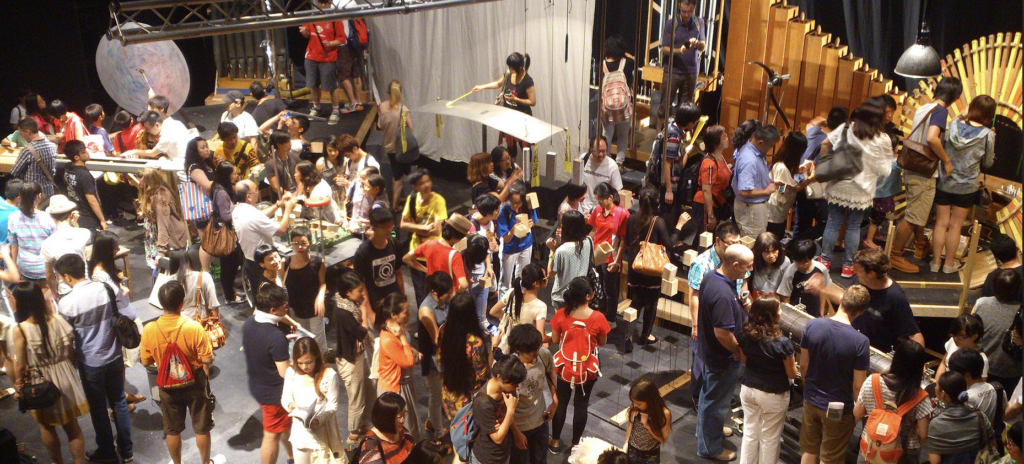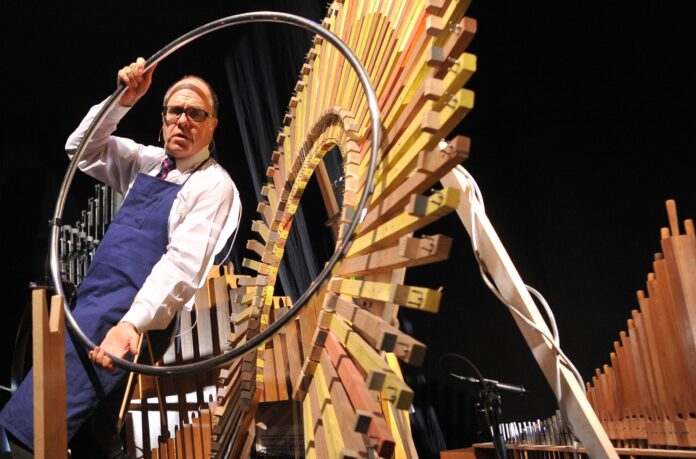“We sometimes need to retreat in order to make sense of things,” says powerhouse percussionist, professor, and conductor Steve Schick over the phone. He’s talking about his show Schick Machine (Fri/15-Sun/17 at Z Space, SF) in which an obsessive instrument inventor/mad sonic scientist named Laszlo Klangfarben locks himself in his basement, poetically interpreting his past through an ever-growing percussive menagerie, including “a giant motorized hurdy-gurdy, a deconstructed pipe organ, a dazzling electrified metal hoop that seems to want to spin forever, woodblocks bouncing around in space, and an array of thrashing metal machines that seem almost to be alive.”
My first thought on hearing Schick say this was that he must certainly have everything figured out. One of California’s top boosters of contemporary music shows absolutely no signs of slowing down, much less retreating, as he reaches 70. Distinguished Professor of Music at UC San Diego, holding the Reed Family Presidential Chair, he also recently served as artistic director of the San Francisco Contemporary Music Players and the La Jolla Symphony and Chorus, and was founding percussionist of the invaluable Bang on a Can All-Stars. He’s currently re-recording his vast solo repertory, and is about to leave for Paris for two months to complete a big composition commission.
Oh yeah, and a few years ago, he walked from San Diego to San Francisco to propose to his wife, a journey which naturally yielded its own musical composition. So, if, as the says, he is entering “a final phase” of his career, he’s certainly going out with a big bang.
Which of course brings us back to the tintinnabulous Schick Machine. The show debuted in 2008, and Schick has brought it here multiple times—”I wouldn’t say it’s been performed as often as Carmina Burana, but it is a better piece,” he quips. The show itself was composed by Paul Dresher, West Oakland’s renowned restless inventor of instruments in the lineage of Bay Area greats like Harry Partch and Lou Harrison, and grew out of a “refreshing partnership” between the two.
“If you’ve ever been to Paul’s studio, you’ll see that it’s very much like Klangfarben’s retreat, full of the most amazing and puzzling things that you want to get your hands on. He’s very much my type of musician because he has such a pure musical soul, conceptualizing and building and playing these instruments. We came to the idea that we wanted to make a big theatrical piece without any standard percussion, which set us on a journey that would take several years.”
Writer-director Rinde Eckert and fellow instrument inventor Daniel Schmidt were brought in, as well as mechanical sound artist Matt Heckert and sound and lighting designer Tom Ontiveros. Eckert gave the project a Proustian spin, with Klangfarben’s whirligigs and gewgaws conjuring for him “a summer storm’s distant thunder and the rain on the roof—the memory of the late-night sound of his mother’s typewriter down the hall.”
“There was a lot of time where we were all sitting together at Paul’s, and Rinde eavesdropped on our conversation, creating a piece built in some extent on my life and a fictionalization of all of our experiences,” Schick said. “I listen to it now and think, man, life has changed a lot since 2005, my life has changed a lot. In a way, the piece is describing a person I used to be. Over the past 15 years and beyond, the piece hasn’t changed so much as we [the creators] have changed, our relationship to the materiality of things.

“To take just one example, we launched this piece in February of the year the market crashed. I remember watching the big stock market ticker they used to have on Market Street and seeing the Dow Jones dip into 6000 range after being up wherever it was for so long. Right as we were giving birth to a huge touring show! I could not even imagine doing something like that now, but we weathered it with difficulty, because it was so provocative and so exciting. The fact that we had any concerts at all during that time was a testament to audience interest.”
While the there is no written score for the “music” that Klangfarben creates—it’s all in the performance, another way Schick has noted personal changes over the years—it’s rooted in a musical sensibility that seems very much last century to Schick. “I’m by no means a Luddite when it comes to music, but the way that Klangfarben uses music to try to make sense of a nonsensical world, the way he tries to make it a more graceful and sane place, feels 20th century to me. It doesn’t feel like science fiction, although it is otherworldly.” (He does acknowledge many resonances with our current pandemic era, when many of us tinkered away in our own retreats to survive.)
There is an old-fashioned generosity to Schick Machine as well, as the audience is invited to come up on stage after the performance and try their hand at the wild apparatus. (There are family matinees on Saturday and Sunday.) “Paul says my part is just the first half of the show,” Shick says with a laugh. “Then I clear out and it becomes a different animal, full of other clatter and laughter. It can get noisy!”
SCHICK MACHINE runs Fri/15-Sun/17 at Z Space, SF. More info here.






